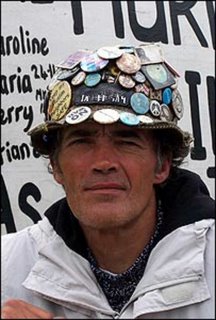It was brought in following the Countryside protest and the subsequent invasion of the commons by Otis Ferry and 8 other hunt protesters, however it was widely speculated that it provided a convenient way of removing Brian Haw who's anti-Iraq protest directly outside the Commons in Parliament Square has proved an embarassing thorn in the government's side for years.
 What was overlooked was that this act could never be enforced against Mr Haw as his protest began before April 1st 2005 when the act came in and his protest has been continuous since before the start of the the Gulf war.
What was overlooked was that this act could never be enforced against Mr Haw as his protest began before April 1st 2005 when the act came in and his protest has been continuous since before the start of the the Gulf war.It would appear that the first casualty therefore, was a slightly lower profile protester. Maya Evans who was found guilty of reading out the names of 97 British soldiers killed in Iraq. This was deemed under the new legislation an 'unauthorised protest'.
This legislation appears to have effectively removed the right to free protest, something that has been part of the rights of all British citizens for centuries.
The government would argue that the act makes provision for protest. If you apply to the Metropolitan Police Commissioner at least 6 days in advance or, if not "reasonably practicable", 24 hours in advance, permission must be granted. However the Commissioner has it in his power to impose conditions on the protest such as:
- When and where it can take place
- How long it can last
- How many people can attend
- How much noise can be made
- The number and size of banners and placards used
These conditions can effectively be used to completely rule out any protest that the government would feel uncomfortable.
There are thought to be 21 more people awaiting trial (in January) on charges brought under this new legislation.
This was brought in under the guise of anti-terror legislation, my personal perspective is that it's entirely protectionist and allows government to repel any protest it finds unpallettable. I find it disquieting that this type of legislation can slip through almost unnoticed, these type of laws are the thin end of the wedge.

3 comments:
Quite agree, six. Every time we object to these laws we are told "if you have nothing to hide.." but they are never used to for their original purpose, only to protect politicians from embarrasment.
Simon
AKA TGS
Here are some links that I believe will be interested
This site is one of the best I have ever seen, wish I had one like this.
»
Post a Comment